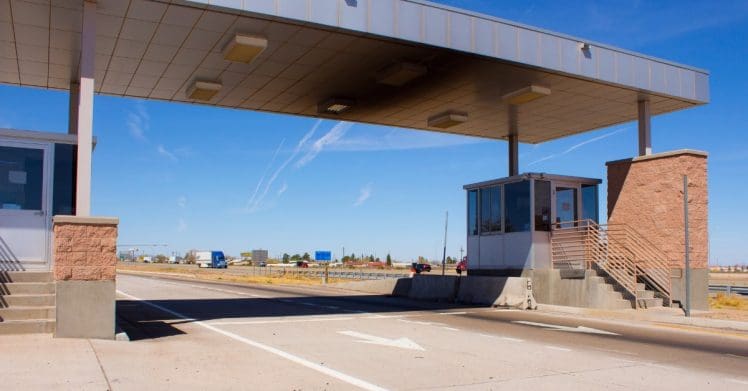
Weigh stations are an important part of the trucking industry and are found just off highways across America. But what are weigh stations used for? A weigh station is a designated checkpoint along a highway where a truck’s weight is checked. These weight inspections are typically done by Department of Transportation inspectors or state highway patrols.
Weigh stations are equipped with truck scales. For older scales, trucks usually stop to be weighed. Newer weigh-in-motion models allow trucks to be weighed while driving through the scale. Typically, trucks and large commercial vehicles are required to use weigh stations.
In trucker lingo, drivers often refer to weigh stations as Chicken Coops, or just plain Coops. A common CB interaction between two drivers may sound something like “Hey, East-Bound, what are the Coops doing behind you?” followed by, “Well, West-Bound, the Chicken House is open and weighing your chicken.”
Why They Are Needed & How They Are Used
Weigh stations are used to check a truck’s weight to ensure it is not overweight and is compliant with state laws and safety guidelines. The weight of a truck is usually calculated in two measurements:
- Axle Weight – The amount of weight carried by each tandem axle on a truck. This is found by dividing the total weight of the load and trailer by the total number of tandem axles and then adding the weight of the tractor or pickup.
- Gross weight – The combined weight of the load, trailer, tractor or pickup, and any added accessories carried by all the tandem axles.
Truck weigh stations are important because weighing trucks prevent overweight trucks from going onto highways that cannot handle the heavy load. Trucks that weigh over the regulated weight limit can cause irreparable damage to roads and bridges. Many states collect taxes on transported goods based on weight. So, truck weigh stations are sometimes used for tax collecting purposes.
Truck drivers should also be prepared to have their freight and/or truck paperwork checked at the weigh station, and possibly undergo a DOT inspection. If a truck is overweight or the weight of the truck does not match the weight of the freight paperwork, then it may indicate alternate cargo is being transported which can lead to CSA violations for the driver.
Where Are Weigh Stations Located?
Weigh stations are located just off the highway and usually next to a scale house where inspectors have their offices. Since each state has a different set of local laws and safety guidelines regulating the weight of trucks and commercial vehicles, weigh stations are often located in ports of entry near state borders. Weigh stations can also be located at choke points or areas where freight is loaded into trucks or delivered.
In addition to fixed truck weigh stations, many states use portable scales that allow weigh stations to be set up in any location that is large enough to accommodate trucks. Portable scales allow DOT and state inspectors to set up seasonal and temporary checkpoints near isolated roads with a high amount of truck traffic. Temporary checkpoints also help prevent truck drivers from avoiding weigh stations.
When Do Trucks Use Weigh Stations?
The majority of states only require trucks and commercial vehicles that weigh over 10,000 pounds in gross weight to stop at weigh stations. To identify exceptions to this rule, truck drivers should research the local requirements and regulations of the states they will be hauling through. Since weight limits vary state by state, trucks typically get weighed when crossing state lines. In some jurisdictions, trucks may also be weighed when leaving a cargo loading area or just before entering a delivery center.
In the United States, most states require trucks to stop at all open weigh stations. If the driver decides not to stop, they are at risk of being pulled over by a state trooper or law enforcement often waiting near the highway re-entry ramp, ticketed, and made to return to the scale. Weigh stations are generally closed during periods of heavy traffic, such as weekends or commuter drive times, and truck drivers are not required to stop at a closed weigh station. There are different ways for a trucker to tell if a weigh station is open, such as apps like Truckers Path Pro, but the most reliable are the indicator lights and other markers on the weigh station signs themselves.
Weigh stations are an important part of the job for truck drivers and they should be paid attention to. Are you interested in training for a CDL? Enroll in our CDL training programs at our Somers, CT, Bridgeport, CT, North Andover/Haverhill, MA and Pawtucket, RI campuses to get started on your Class A CDL training or Class B CDL training. Contact New England Tractor Trailer Training School (NETTTS) to learn how to sign up for our CDL classes!




